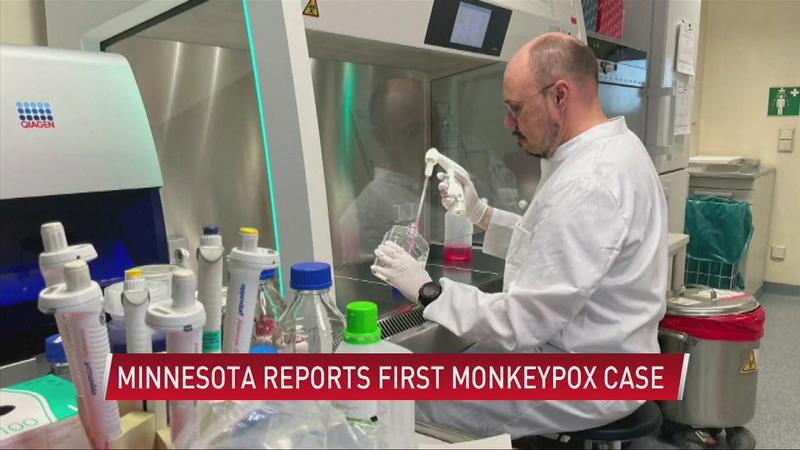Minnesota health officials report 1st presumptive case of monkeypox
[anvplayer video=”5118364″ station=”998128″]
(ABC 6 News) – The Minnesota Department of Health reported a presumptive case of monkeypox virus infection in an adult in the Twin Cities area.
Initial testing was completed on Saturday at the MDH Public Health Laboratory and confirmatory testing is being done at the U.S. Centers for Disease Control and Prevention (CDC) in Atlanta. The patient likely was exposed while traveling abroad.
The patient is receiving outpatient care. MDH is conducting contact tracing with local health partners to identify anyone who may be at risk due to direct close contact with the patient while infectious. People with direct close contact are asked to watch for symptoms of illness.
"For many people the virus, infection, illness, isn’t severe enough that they need to be hospitalized," said Dr. Richard Kennedy with the vaccine research group at Mayo Clinic.
The need for vaccine or antivirals is being evaluated on a case-by-case basis, in consultation with CDC officials. The CDC does not recommend broader use of the vaccine at this time; however, their evaluation of vaccine guidance is ongoing.

The virus does not easily spread between people with casual contact, but transmission can occur through contact with infectious sores and body fluids; contaminated items, such as clothing or bedding; or through respiratory droplets associated with prolonged face-to-face contact.
“While the threat of monkeypox generally remains low, it’s important that everyone be aware of this disease, so that those at risk can seek medical care and get tested promptly if they believe they have symptoms,” said Minnesota Health Commissioner Jan Malcolm.
As of June 24, CDC reports 201 cases of monkeypox/orthopoxvirus in 26 other U.S. states. In recent months, more than 4,100 cases have been reported in 47 countries where the disease is not typically reported. Because monkeypox requires close and prolonged contact, close-knit social networks have been particularly impacted. Close contact, sustained skin-to-skin contact, including sexual contact, with a person with monkeypox or contact with contaminated items are important risk factors.
Over the last month, MDH has been working with health care providers and community partners to promote awareness of monkeypox, including what symptoms to look for, how to test for it, and ways to help prevent transmission.
Symptoms of monkeypox can include fever, headache, muscle aches, swollen lymph nodes, and a rash that can look like pimples or blisters. In this outbreak, some individuals have had a rash only and no other symptoms, and sometimes the rash consists of only a few sores. The rash can occur in the mouth, and there may be sores in the genital and anal areas. In other cases, a rash may be on the face and on other parts of the body.
The illness typically lasts two to four weeks and most people get better on their own without treatment. However, sometimes monkeypox can cause scars from the sores, lead to pneumonia, and in rare cases even be fatal. People who have monkeypox can spread the virus from the time symptoms start until the rash has fully healed and a fresh layer of skin has formed.
To prevent the spread of monkeypox:
- Practice good hand hygiene. For example, washing your hands with soap and water or using an alcohol-based hand sanitizer.
- Minimize skin-to-skin contact with individuals who have been exposed to the virus or to those showing a rash or skin sores.
- Avoid contact with any materials, such as bedding, that has been in direct contact with someone with monkeypox.
- Reach out to a health care provider if you develop symptoms, as early recognition and testing can help prevent further transmission.
More information about the virus and how to limit infection risk can be found on the Monkeypox page on the MDH website.